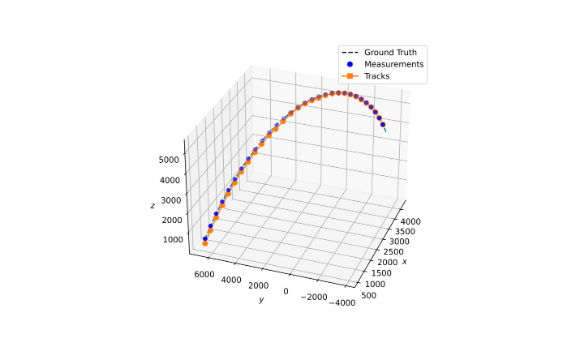Tracking space satellites
Ben Oakes - A Case Study of Stone Soup for Astro
Tell me about your work
I have recently been working on a project called ‘Stone Soup for Astro’. Stone Soup is an open-source Python framework for tracking and state estimation maintained by Dstl, and supported by a wide community of open-source code contributors. Stone Soup is designed as a modular framework with easily configurable components that can be arranged in many ways to build and compare target tracking and data fusion algorithms. Whilst there are now many models and scenarios for air, ground, and maritime applications, there is currently a limited capability for space-based problems. Space is quickly becoming an exciting and much needed research area with the increasing number of satellites being launched into orbit. We rely on satellites for many parts of our day-to-day lives; they are used for GPS, communication, and internet as well as many other areas. So, the need to track them with limited sensor availability is becoming ever more important. Currently, although there are some implementations of different astrodynamic models, and separate tracking algorithms, there is no easily accessible and open-source framework that implements these algorithms together to allow for easier research.
In this project, we have been working to build a plugin that will interface with Stone Soup and will contain a variety of useful models for tracking in space, including satellite models. This project is being completed with Dstl, and the plugin will contain models produced by the European Space Agency (ESA) and models from Dstl. This will make it easier to apply tracking algorithms to space scenarios, and increase our capability to adapt and implement tracking algorithms to the space domain. In the long run, the plugin and these algorithms will improve our space situational awareness and ensure the safety of our satellites.
I was uniquely suited to help deal with this project due to my background in astrodynamics, as well as my knowledge and experiencing of producing code for collaborations like Stone Soup. I have previously contributed to Stone Soup with a reinforcement learning sensor manager example and understand how to write code that is understandable and trustworthy. Combining these skills was necessary to work on this project, as one must have confidence in the astrodynamic models to be able to implement them in the plugin.
I thought this experience was invaluable. Working with people from industry is a great way to gain an appreciation for how things are done in the real world and how the work done in the university will have real-world applications. It is exciting working with a range of interests and backgrounds to produce something that is beneficial and useful for all.

What impact will your project have
The development of this plugin will allow people with an interest in tracking space-based objects to use and produce new models and algorithms, which will eventually help the UK contribute to the safety and security of the space domain. As is the goal with Stone Soup, researchers will be able to compare new algorithms and models with the current state of the art in an easy to use and demonstrate way. The expertise in space, tracking and programming at the University of Liverpool is greatly appreciated by the researchers at Dstl as we continue to work together.
Personally, working on this project has given me a great insight into collaborating with industry in a slightly more involved way than I experienced on the PhD. Producing quarterly presentations and watching the codebase grow as new things are implemented are hugely rewarding.
Keywords
Space, Astro, Stone Soup, Python, State Estimation